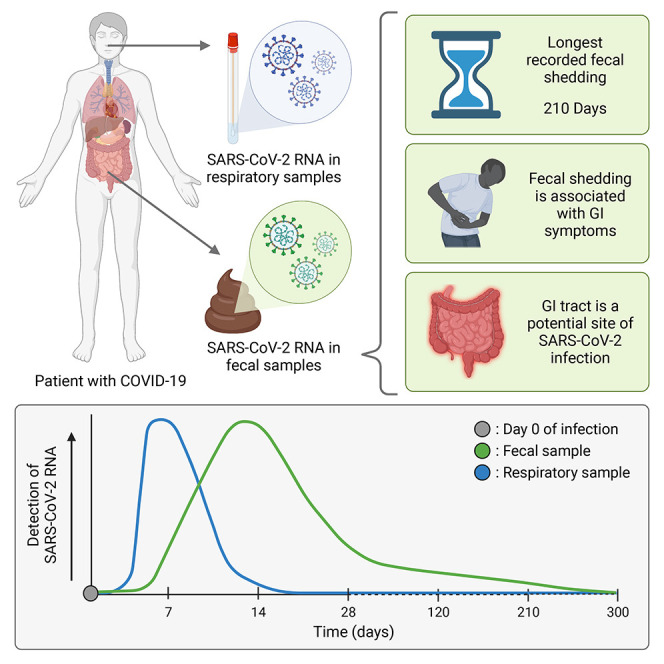- Record: found
- Abstract: found
- Article: not found
Gastrointestinal symptoms and fecal shedding of SARS-CoV-2 RNA suggest prolonged gastrointestinal infection

Read this article at
Abstract
Background
COVID-19 manifests with respiratory, systemic, and gastrointestinal (GI) symptoms. 1,2 SARS-CoV-2 RNA is detected in respiratory and fecal samples, and recent reports demonstrate viral replication in both the lung and intestinal tissue. 3–5 Although much is known about early fecal RNA shedding, little is known about the long term shedding, especially in those with mild COVID-19. Furthermore, most reports of fecal RNA shedding do not correlate these findings with GI symptoms. 6
Methods
We analyze the dynamics of fecal RNA shedding up to 10 months after COVID-19 diagnosis in 113 individuals with mild to moderate disease. We also correlate shedding with disease symptoms.
Findings
Fecal SARS-CoV-2 RNA is detected in 49.2% [95% Confidence interval = 38.2%-60.3%] of participants within the first week after diagnosis. Whereas there was no ongoing oropharyngeal SARS-CoV-2 RNA shedding in subjects at and after 4 months, 12.7% [8.5%-18.4%] of participants continued to shed SARS-CoV-2 RNA in the feces at 4 months after diagnosis and 3.8% [2.0%-7.3%] shed at 7 months. Finally, we find that GI symptoms (abdominal pain, nausea, vomiting) are associated with fecal shedding of SARS-CoV-2 RNA.
Graphical abstract
Abstract
Natarajan et al perform a longitudinal study of fecal SARS-CoV-2 RNA shedding in patients with mild-to-moderate COVID-19, revealing that patients can shed RNA for up to 7 months after infection, shedding is associated with gastrointestinal symptoms, and the gastrointestinal tract may be infected even after the respiratory infection has cleared.

